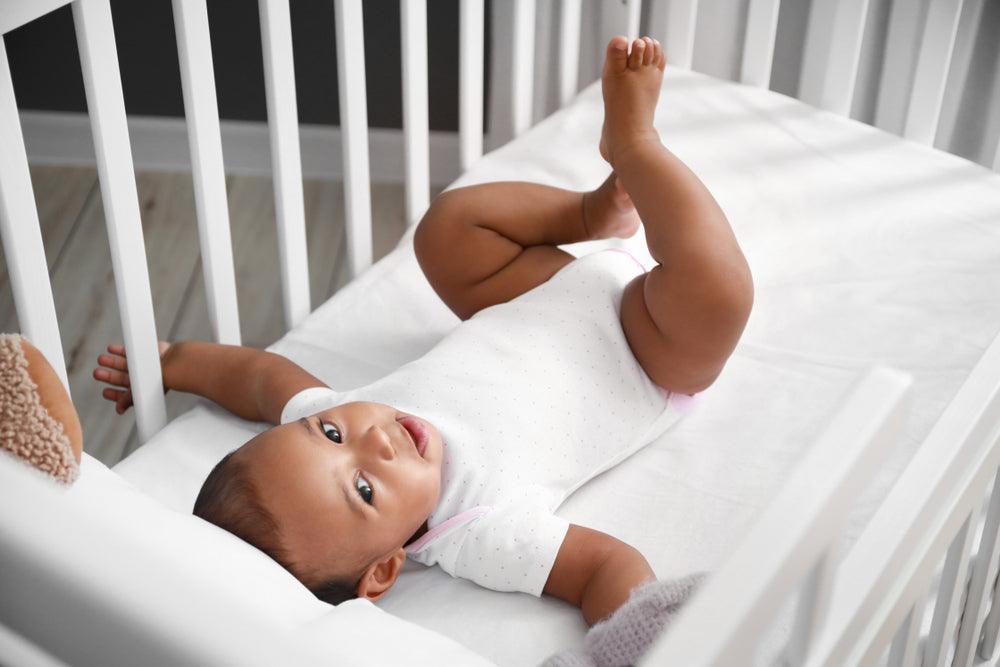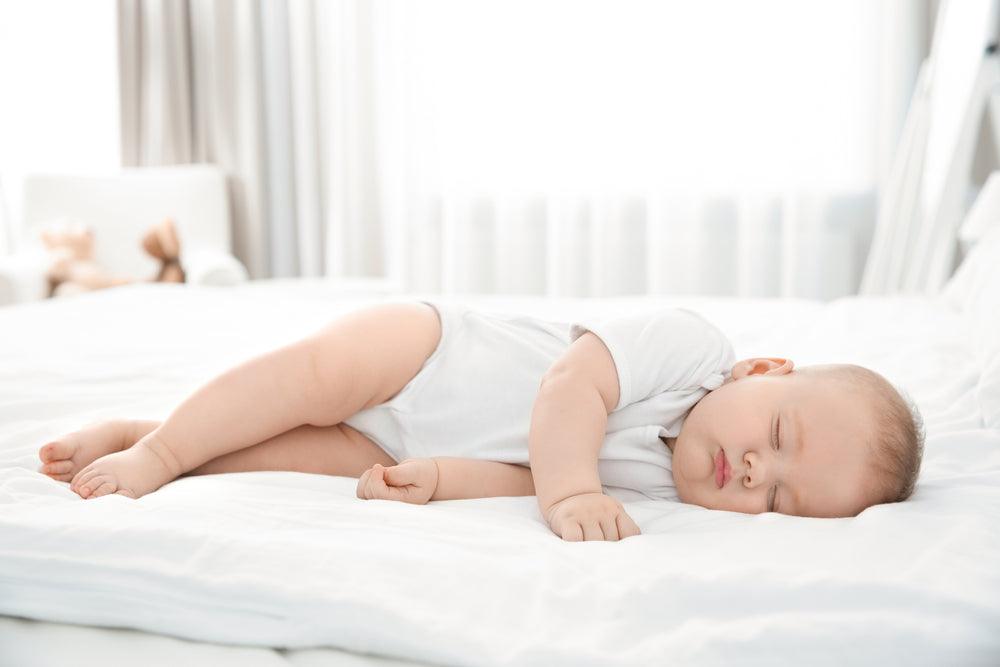You depend on your baby monitor to help you keep an eye on your child, but the devices are only effective if they are in the right place. It especially applies to baby video monitors. When it's in the wrong place or incorrectly angled, you may be monitoring the floor or ceiling instead of your baby.
To ensure you are getting the most use out of your baby monitor, here are some tips on where you should place the device.
What to Consider When Placing a Baby Monitor
Along with placing the monitor at the correct angle for the microphone and camera, you also want to think about your baby’s health and safety of your baby before installing the device with our baby breathing monitors.
Electrical cords and electromagnetic radiation are potential dangers you want to eliminate.
Privacy intrusions are another concern with Wi-Fi-enabled baby monitors. The last thing you want is a stranger hacking into the monitor.
Health and Safety
Baby monitors may be small, innocent-looking devices, but they emit a small amount of electromagnetic radiation. Research shows baby monitors placed 3.2 feet or closer to your baby emit the same level of electromagnetic radiation as a cell phone tower when you are standing 500 feet away.
The other safety concern is the cord. Not all monitors are wireless, and if yours comes with a cord, it is a potential safety hazard. In addition, if the cord is too close to your baby, there is a risk of choking or strangulation.
Microphone and Camera Angles
Most modern baby monitors come with cameras, along with standard microphones. The camera gives you an added sense of comfort, but only when it is properly angled. You want to place the baby monitor where the camera has an unobstructed view.
Baby monitors have different viewing angles. Some offer a wider view than others. Play around with the camera’s position until you have a clear view of the area you want to monitor.
If your monitor comes with remote viewing functions like tilt, zoom, and pan. It's a little easier to fine-tune the camera's viewing angle. Baby monitors without these functions need to be manually adjusted. It takes a little more time, but it's necessary if you want to monitor your sleeping baby continuously.
A good tip to remember: Place the monitor at a higher angle for infants and lower it as your baby grows. It will give you the best view of your baby throughout the growing stages.
Where to Place Your Baby Monitor
You have a few options when you are looking for a place to set up the baby monitor. If the monitor is corded, you want to be close to an outlet but far enough away that your baby can't grab onto the cord.
Mounting a Baby Monitor on the Wall
Video baby monitors often come with the option of mounting them on the wall. Sometimes the mount is built-in, and others have a separate attachment.
If the monitor is designed for wall installation, it usually has a secure system that makes it a breeze to install. Others have a small hole, which is also easy to install. The only downside is the lack of security. Adding a piece of double-sided tape, in addition to the wall mounting system, will ensure the monitor stays securely in place.
Before you mount the baby monitor, double-check the camera and microphone angles. It’s hard to take it down and reinstall it. Don’t forget to secure any cords and wires. They present a safety hazard. You can find inexpensive cord covers for the wires on the floor and wall.
A helpful tip is to run the wires behind furniture, curtains, or in a corner. Not only does your baby’s room look cleaner, but it is also safer.
You can mount a baby monitor on the wall in five easy steps.
- Test the audio and camera angle: Before you mount the video baby monitor, have someone hold it in place. It lets you ensure you have a clear view of your baby, and the microphone picks up any external noises.
- Mark where the screws go: Place a small “x” or another mark on the wall where you need to drill holes for the screws.
- Drill holes in the wall: Carefully drill small holes the size of the screws in your wall. Try to drill in the center of the marks to ensure the monitor is level.
- Screw the base into the wall: some Monitors that allow for wall mounting come with bases. Screw the base into the wall before attaching the monitor.
- Connect the monitor to the base: Most bases have a clip or other type of locking mechanism that securely attaches the monitor to the base.
Installing Your Baby Monitor on a Shelf
It will depend on where the shelves are, and if you have an unobstructed view of the crib. A shelf can be safe to install a baby monitor and it’s also convenient. The monitor isn't permanently mounted, so you can move it around as needed.
Most parents only have one baby monitor, especially if the camera has remote options. These monitors are expensive, but you can get by with one. When it’s sitting on a shelf, you can easily take it with you during visits to friends and family.
You want to place the monitor at least three feet away from the crib for safety and watch out for any cords and wires. It’s also not a good idea to place the baby monitor on a shelf above the crib. You may get an excellent viewing angle, but the monitor can fall into the crib.
If you don’t have a shelf, you can easily install a small one in the ideal place.
Using a Dresser or Changing Table
A dresser or changing table is another option. Most dressers are tall enough to give you a clear view of the crib. The same also applies to changing tables.
Using a dresser, you can place the baby monitor for a view through the bars. Some models come with extensions that let you angle the device above your baby’s crib.
If you decide to use the changing table, be careful where you place the baby monitor. Placing it too close to the diaper pad may make it easy for your baby to knock it onto the floor. Baby monitors are durable, but they are not designed for frequent falls. You also don’t want your baby to be able to reach any cords and wires.
Where Not to Place a Baby Monitor
There are a few places you don't want to place a baby monitor. You know to keep it out of your baby's reach, including the wires and cords. You also know for safety, the monitor shouldn't be closer than three feet, but there are other places you want to avoid.
Cribs and Bassinets
You don’t want to attach a baby monitor to a bassinet. It’s an unstable surface and too close to your baby, even as an infant.
Unstable Surfaces
You want to avoid any narrow surfaces that leave the baby monitor precariously balanced. It includes toys and crib railings.
Look for a large flat surface like a dresser, changing table, or shelf. If you don't have space on a flat surface, consider mounting the baby video monitor on the wall.
Placing a Baby Monitor for Infants and Toddlers
Your child's age plays a key role in where you place a baby monitor. Infants are less likely to start playing with the device. On the other hand, a curious toddler will want to see what it is. Keeping the monitor higher on the wall or a top-shelf prevents inquisitive youngsters from playing with it. Height isn't a problem with newborns, the most important aspect is your viewing angle.
When you are placing a baby monitor for a newborn, a vertical angle usually gives you the best vantage point. When your child can stand, lower the camera angle a little bit. You'll be able to see when your toddler is awake and if they are getting into any mischief.
Keep Hackers Out of Your Baby Monitor
Where you place the baby monitor is important for your infant’s health and safety, but there is another risk you want to be aware of.
Baby monitor technology is advancing, and now several models connect seamlessly to your Wi-Fi or smart home system. It gives you instant and convenient access to your baby’s room when you’re away. Unfortunately, the convenience comes with the possibility hackers will be able to access the monitor. No parent wants strangers watching their baby or scoping out the inside of their home.
There are a few simple steps you can take to keep your baby safe and hackers away.
Use Strong Passwords for Everything
Start by creating a strong password for your router. Make sure all of the firmware is updated and check the router’s default settings. Some routers allow remote access, you want to disable this feature. It’s convenient when you’re not home, but it also leaves a door open for hackers to get in.
Use a strong password that does not include personal information. The same also applies to the baby monitor. Use a different password than the one for the router, and don’t forget to change the monitor’s default settings.
Update the Monitor’s Firmware
The camera on the baby monitor uses firmware that can be hacked if it is not regularly updated. Updates usually come out at least once a year to help consumers prevent hacking.
Updating the firmware is usually a few simple steps, but every baby monitor is different. If you can’t find the information in the user’s guide, check the manufacturer’s website. You can also contact the manufacturer’s customer service department if you are still having trouble finding information on firmware updates.
Disable a Few Features on the Baby Monitor
Not all baby monitors come with DDNS, port forwarding, or UPnP functionality. If yours doesn’t, you don’t have to worry about this step. Baby monitors that have one or more of these features can become targets of hackers.
You can easily disable these features in the monitor’s settings. The steps vary according to the brand, but all make it relatively easy. If you run into trouble, contact the manufacturer.
Don’t Use the Remote Access Function
It's not uncommon for baby monitors to let you use the camera via the internet. It's becoming a standard feature parents love to use when they are away from home. It is convenient to feel close to your baby, but it also comes with security risks.
Accessing the baby camera online removes several of the security protocols. Creating a strong password for the remote access function will help, but it’s not enough to keep a determined hacker out. The best way to prevent strangers from accessing the monitor’s camera is to disable the function. It’s easy to do in the settings menu.
Sometimes, you have to access the camera remotely, and you can take a couple of steps to make it safer. Changing the default camera access port setting to 8100 or higher makes it more difficult for hackers to get in.
You also want to monitor the activity logs for the camera. It displays the IP addresses and times the camera is accessed. Any unfamiliar addresses may indicate the presence of a hacker. IN this case, disable remote access and change all of your passwords.
Final Thoughts
A baby monitor keeps you connected to your infant. It is a great device to have, but you want to think carefully about where it is placed. Think about the health and safety of your baby before installing the device. You also want to pay attention to the camera angle.



